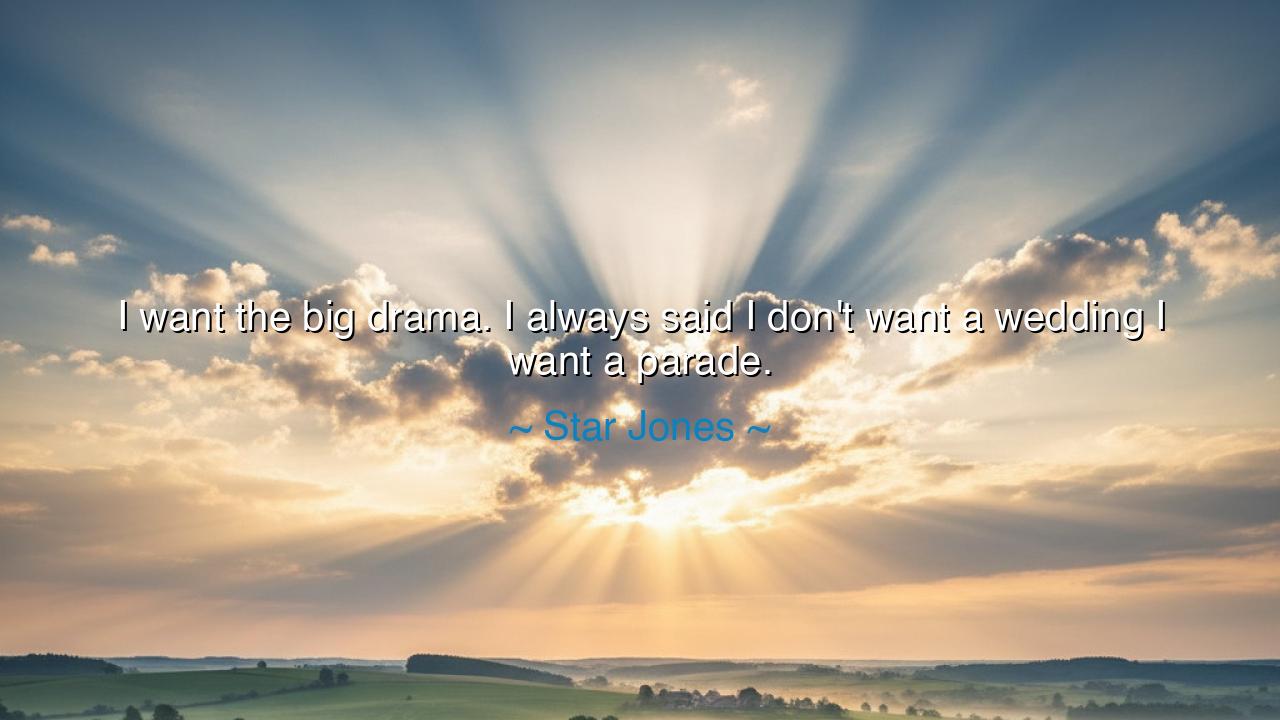
I want the big drama. I always said I don't want a wedding I






The words of Star Jones blaze with unapologetic candor: “I want the big drama. I always said I don’t want a wedding, I want a parade.” In this bold declaration, she strips away modest pretense and embraces spectacle, declaring that for her, love’s covenant must be adorned not only with intimacy but with grandeur. For some souls, the joining of two lives is not enough; it must also be proclaimed as a festival, a procession for all to see, echoing the triumph of joy across the world.
The wedding, in its essence, is a solemn vow between two hearts. Yet through the ages, it has also been a display of identity, of status, of belonging. Jones’s words reveal the ancient longing to make personal joy into public celebration. A parade is not private; it is a march of banners, a proclamation to the community that love is not only whispered in chambers, but shouted from the rooftops. To desire a parade is to desire one’s love to be immortalized in memory, seen, and honored by many.
History is filled with such spectacles. Consider the royal weddings of Europe, where kings and queens paraded through streets filled with citizens, their unions woven into the destiny of nations. When Prince Charles wed Diana, the procession was watched by millions, not merely as a marriage but as a pageant of continuity, identity, and hope. So too did Cleopatra and Mark Antony stage lavish displays of their love, binding passion with political drama. These examples show that weddings have often strayed into the realm of parades, carrying meaning far beyond the private bond.
Yet Jones’s desire also carries a deeper truth: that the human heart longs for recognition. Love is not content to hide; it wishes to shine. The drama she seeks is not merely excess but the affirmation that this union matters, that it deserves to be heralded with joy, color, music, and spectacle. In a world where many vows are broken in silence, a parade proclaims permanence, daring all who witness to honor what is unfolding.
Therefore, let this wisdom endure: while some choose simplicity and others choose spectacle, the measure of a wedding is not its scale but the truth of its love. Yet there is no shame in desiring splendor, for celebration is part of the human soul. As Star Jones declared, some unions call not only for vows but for parades—for in the great drama of life, love deserves sometimes to be more than whispered; it deserves to be sung like a triumphal march.






Tthanh
I find this statement delightfully over-the-top, but it also makes me think about how people express happiness differently. For some, love is quiet and sacred; for others, it’s a full-blown festival. There’s no right or wrong way, but I do wonder if the ‘parade’ mindset creates unrealistic expectations for what marriage itself will feel like. Can a relationship live up to that kind of spectacle once the confetti settles?
QDNguyen Quoc Dat
There’s something both humorous and revealing about this quote. It’s not just about weddings — it’s about wanting to be seen, celebrated, and validated. I think a lot of people can secretly relate, even if they’d never admit it. Still, I wonder what that desire says about our culture’s obsession with visibility. Have we turned love into a public performance instead of a private promise?
HHHUNG HOA
This line says so much about personality and self-image. It feels like she equates love with spectacle, which isn’t necessarily negative — it’s just expressive. I wonder, though, if such a large-scale celebration reflects genuine joy or social expectation. Do you think there’s pressure, especially for public figures, to make personal milestones bigger than life? It’s fascinating how weddings often become statements about identity rather than just relationships.
HNThi Huong Nguyen
It’s such a dramatic sentiment, but in a fun way. She seems to embrace the idea that love should be celebrated loudly and joyfully. Still, it makes me curious — do grand gestures make the emotions more real, or do they risk making everything feel like a production? Maybe her ‘parade’ represents more than extravagance; perhaps it’s about being proud of love and wanting the world to witness it.
ATNguyen Ngoc Anh Trang
I admire the confidence behind that statement — it’s refreshingly honest. Some people truly see weddings as expressions of identity, not just love. But it also raises a question: when does celebration turn into self-promotion? I find it fascinating how different people view the purpose of a wedding. Is it a sacred union or a stage for self-expression? Maybe both can coexist if the intention is authentic.